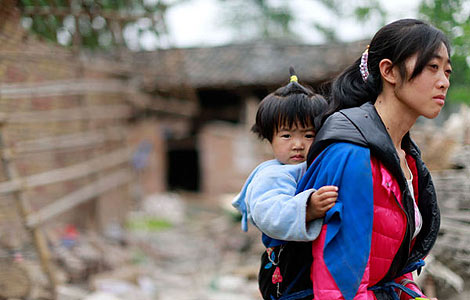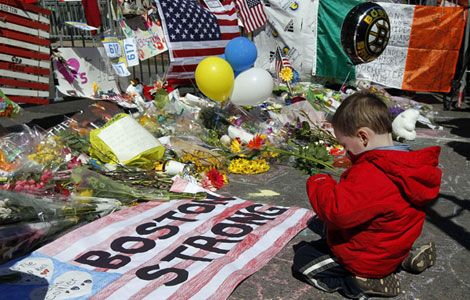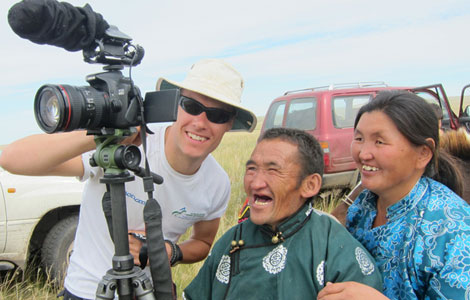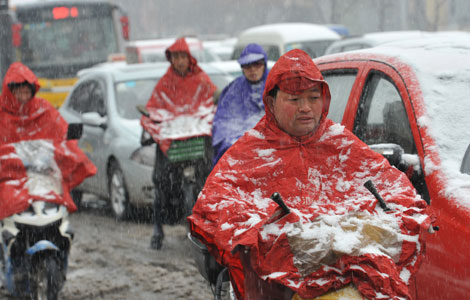When a helping hand is more of a hindrance
Updated: 2013-04-23 08:10
By Tang Yue (China Daily)
|
||||||||

Traveling from Chengdu to the epicenter of the earthquake in Lushan country, or to Baoxing, 30 kilometers from the epicenter, I passed many groups of volunteers on their way to the affected areas.
I understand and admire their desire to help, their compassion for the victims - but it might have been better for them to think twice about what they were doing.
I met Cheng Mu, for instance, in Lushan on Monday. The pleasant-faced man in his 30s runs a small business in Chengdu. He helped for nine days when the magnitude-8 earthquake hit Wenchuan, Sichuan province, on May 12, 2008.
Cheng had spent all the time driving his sport utility vehicle across the county between towns transporting Bluesky Rescue Team members.
He told me that was the only way he could really help.
He had met many other enthusiastic volunteers who wanted to go deep into the disaster regions.
But their presence in the area had added to the difficulties the rescue effort faced.
Some had not brought enough food or water with them, he said, and had to use supplies that were meant for the victims.
"There are different types of volunteer. The Bluesky people, for example, are also amateurs, but every one of them is professionally trained," he told me.
At around midnight on Sunday, Cheng got a message on his phone from a volunteer who was lost and was asking for help.
The location was marked as "2 km south of Baoxing county", about 40 km from Lushan, where Cheng was staying.
As he hurried to the spot with two other Bluesky Rescue Team members, the lost volunteer messaged that he had found his way out of the mountains and there was no need to come anymore. By the time Cheng's group got back to their base in Lushan, it was already 5 am, and none of them had gotten any sleep that night.
I also met two other volunteers from Beijing, one 24, the other 25, both office workers.
They had flown to Chengdu as soon as they heard about the disaster. They rented a car and headed straight for Lushan.
Though eager to help, they admitted they had no experience with earthquakes or search and rescue operations in quake zones.
For equipment, they had only two helmets and some commonly used drugs.
The government has issued guidelines suggesting that people should not try to approach the disaster areas without permission, and to let the professionals do their jobs, especially within the first 72 hours of an earthquake - the most important time in the rescue operation.
The famous writer Han Han, who has almost 13 million followers on Sina Weibo, has reflected on the roles of volunteers and celebrities after a disaster, based on his experience in Wenchuan five years ago.
As a news reporter on the front line, I have been reflecting too.
Some people suggest situations like this are too dangerous for the media to get close to.
I think it is my duty to be here, to tell people the facts and to report on the rescue efforts made by everyone.
All that matters for many people at times like this is making a contribution, and having such an attitude is a good thing.
But being professional is even more important, and that applies to reporters and volunteers.
Contact the writer at tangyue@chinadaily.com.cn
(China Daily 04/23/2013 page4)

 Obama celebrates young inventors at science fair
Obama celebrates young inventors at science fair
 Earth Day marked around the world
Earth Day marked around the world
 Volunteer team helping students find sense of normalcy
Volunteer team helping students find sense of normalcy
 Ethnic groups quick to join rescue efforts
Ethnic groups quick to join rescue efforts
 Earthquake leaves family shattered
Earthquake leaves family shattered
 Boston Marathon bombing suspect charged
Boston Marathon bombing suspect charged
 Chasing vestiges of the Great Wall
Chasing vestiges of the Great Wall
 Weekly Photos: April 15-21
Weekly Photos: April 15-21
Most Viewed
Editor's Picks

|

|

|

|

|

|
Today's Top News
Russia criticizes US reports on human rights
China 'aims to share its dream with world'
Chinese president appoints 5 new ambassadors
Nation's IPR suits see spike in 2012
H7N9 not spread between humans: WHO
Health new priority for quake zone
Sino-US shared interests emphasized
China, ROK criticize visits to shrine
US Weekly

|

|






